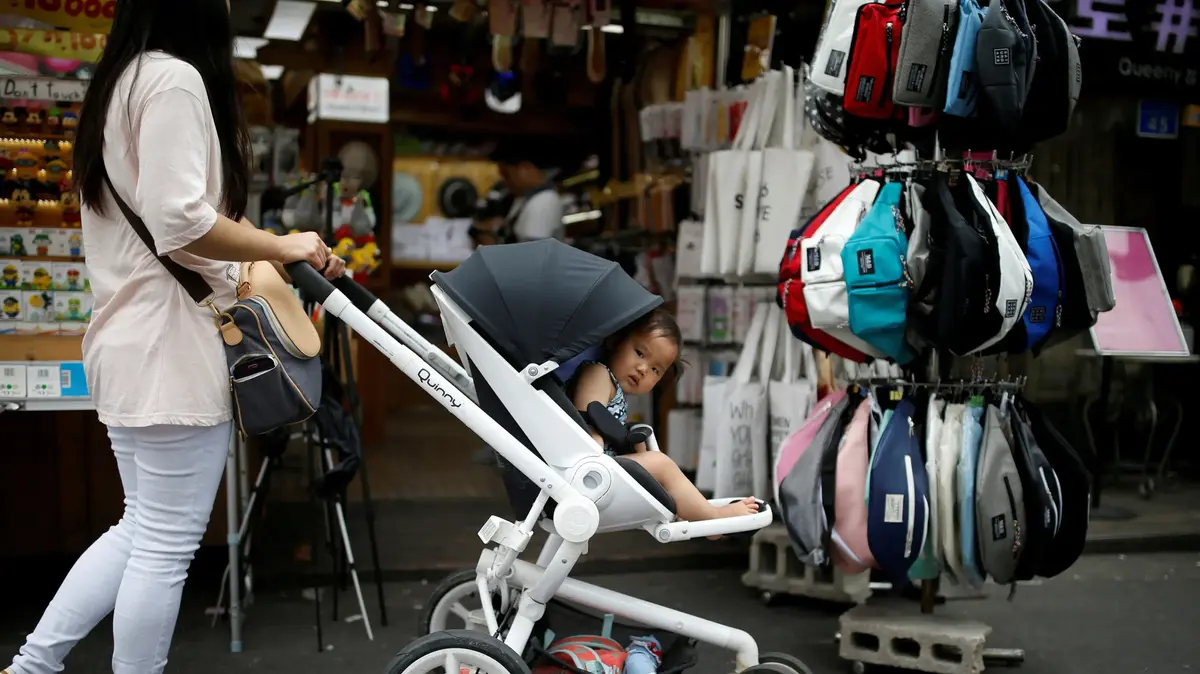health
news
For the first time in this country more people are being born than born
Data from South Korea reveal a global problem of declining productivity.
Now that the corona plague is raging, there is a fear that the numbers will fall further, and this has a dramatic effect on the economy and society.
Tags
birthrate
Korea
Walla!
health
Wednesday, 06 January 2021, 13:10
Share on Facebook
Share on WhatsApp
Share on general
Share on general
Share on Twitter
Share on Email
0 comments
blue eyes
Shirbit CEO: "We are working for a quick return to activity ...
Edelstein: Vaccinating at a crazy rate, we will get millions more ...
Corona commissioner in the ultra-Orthodox sector: "Elections affect ...
Long queues at the vaccination complex in Ichilov 27.12.20
Netanyahu on the corona mutation: We have taken the right steps ...
Netanyahu: We will strive to have as many vaccines as possible ...
A dentist demonstrates how to clean the brush
The healthy pelvic device is biofeedback for training the pelvic floor muscles
The healthy pelvic device is biofeedback for training the pelvic floor muscles
Anger in France over corona vaccine rate: "Scandal ...
In the video: South Korea tightens restrictions following rising morbidity (Photo: Reuters)
For the first time ever, South Korea recorded more deaths than births in 2020 and raised real concern in a country already holding the lowest birth rate in the world.
Only 275,800 babies were born last year, down 10 percent from 2019. Around 307,764 people died.
The data prompted the Interior Ministry to call for "substantial changes" in its policy.
More on Walla!
NEWS
"Jaw drop figure": The world's population will decrease by half to the end of the century
To the full article
The population is declining and the burden on the country is very high.
Aside from increased pressure on public spending as the demand for health and pension systems increases, a declining youth population also leads to a shortage of work which directly affects the economy.
Last month, President Moon Jae-in launched a policy aimed at addressing the low birth rate, including financial incentives for families.
More on Walla!
NEWS
The baby boom that will come after the corona will be for the wrong reasons
The most fertile woman in the world: gave birth to 44 children before the age of 36 and raised them alone
Hair transplant for men and women: Istanbul is open and offers a natural and permanent solution
According to the plan, from 2022, each child born will receive a cash bonus of 2 million Korean won, equivalent to six thousand shekels, to help cover prenatal expenses, in addition to a monthly payment of 300,000 won distributed until the baby reaches one year of age.
The incentive will increase to 500,000 monthly starting in 2025.
Parents wait for their children outside the university in Seoul (Photo: AP)
By and large, this is because in South Korea, women are struggling to achieve a balance between work and other life demands.
Hyun-Yuk is one of them.
The eldest of four, she dreamed of starting a large family of her own.
But in the face of unfriendly conditions in South Korea, she is reconsidering her plans to have children.
She recently got a new job and now she is afraid of being absent from it in favor of maternity leave.
"People tell me it's safer to build my career first," she told the BBC.
Rising real estate prices are another major issue. Kim notes that rising property prices are rapidly discouraging even young couples. “To have children, you have to have your own home.
But it has become an impossible dream in Korea. "Sounds familiar to you? Kim is also not convinced by the incentives offered by the government." It is expensive to raise a child.
The government that provides a few thousand more will not solve our problems. "
The rate of fertility is declining
Last July, researchers at the University of Washington published in the scientific journal The Lancet a warning that "the world is not prepared for a global birth rate crash whose consequences for society are likely to drop jaws."
According to them, the decline in the fertility rate means that almost every country in the world will suffer from a depletion of its population by the end of the current century.
The populations of 23 countries, including Spain and Japan, are expected to be cut in half by 2100. The countries will also face a dramatic aging of the population, with the number of people reaching the age of 80 equaling the number of babies born.
The fertility rate - the average number of babies each woman gives birth to - is declining.
If this figure drops below 2.1 children on average, the world population will start to shrink.
In the 1950s, women gave birth to an average of 4.7 children.
Share on Facebook
Share on WhatsApp
Share on general
Share on general
Share on Twitter
Share on Email
0 comments








